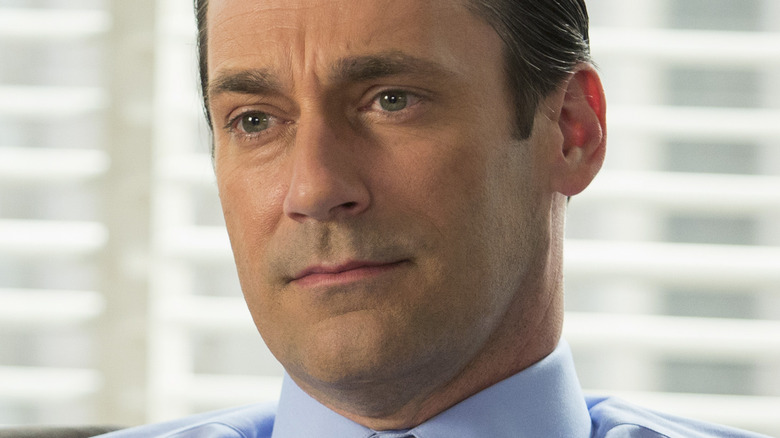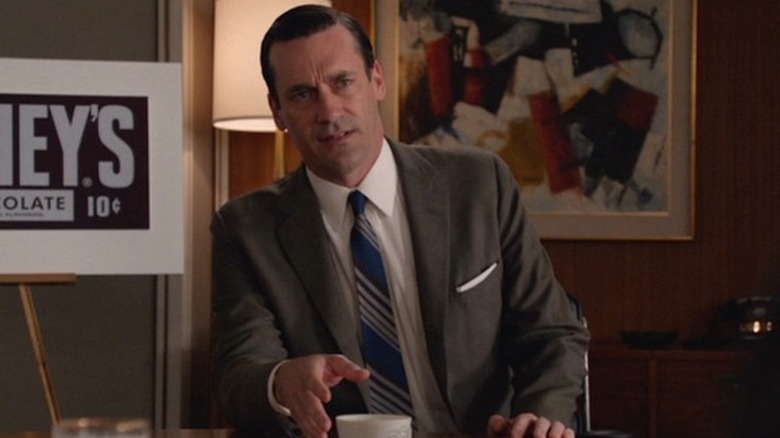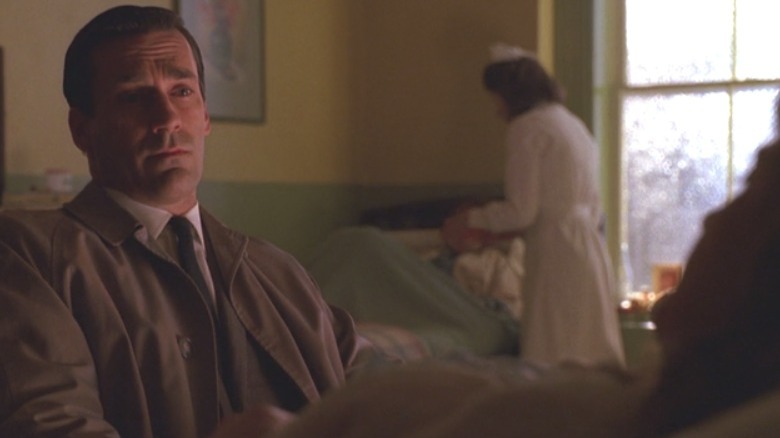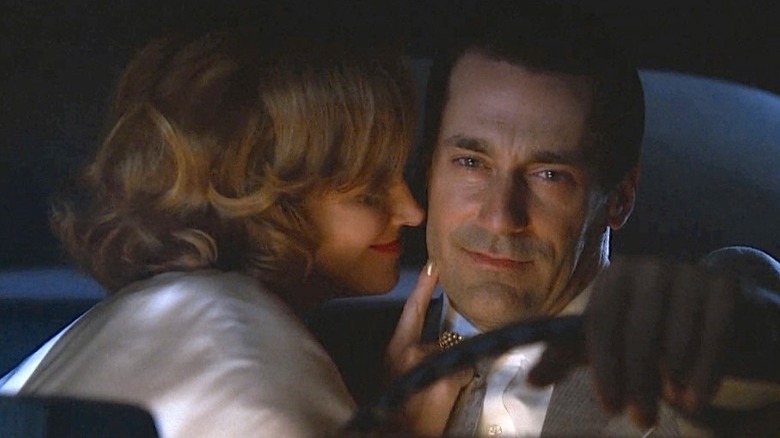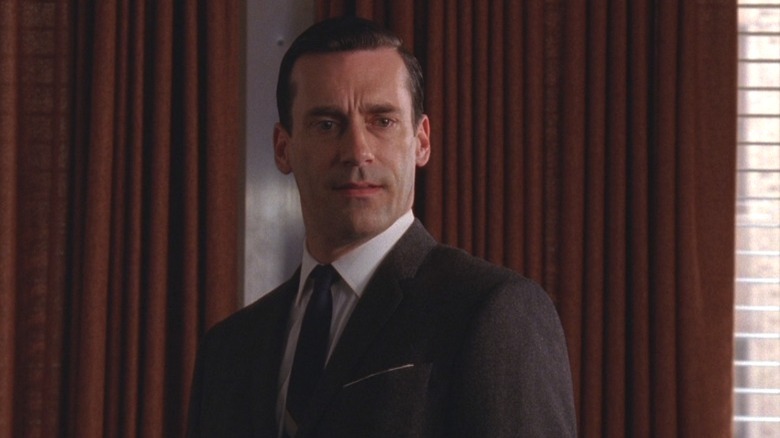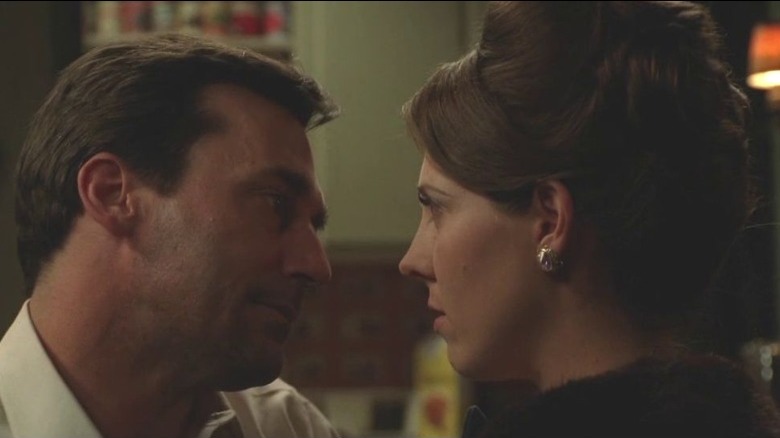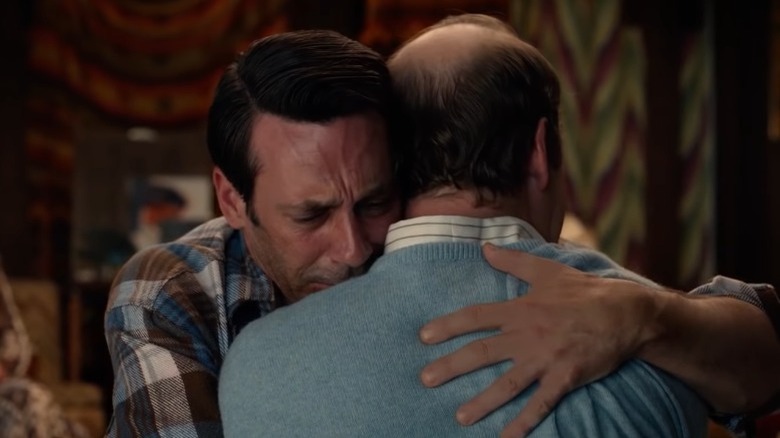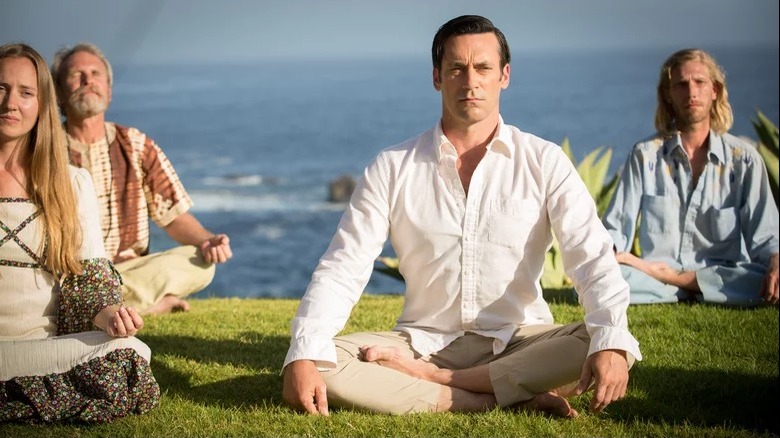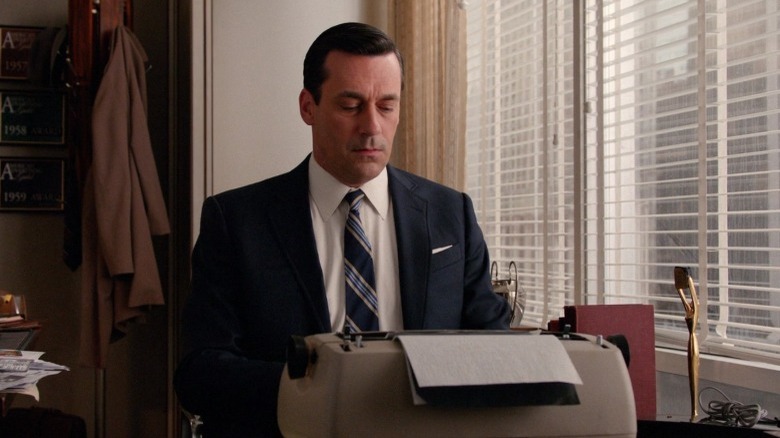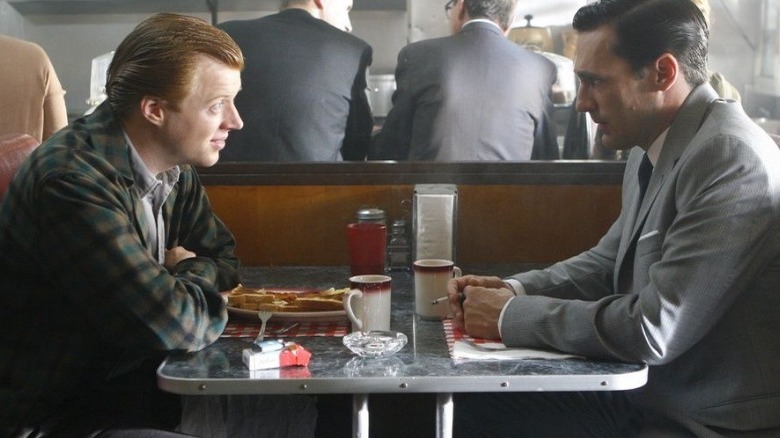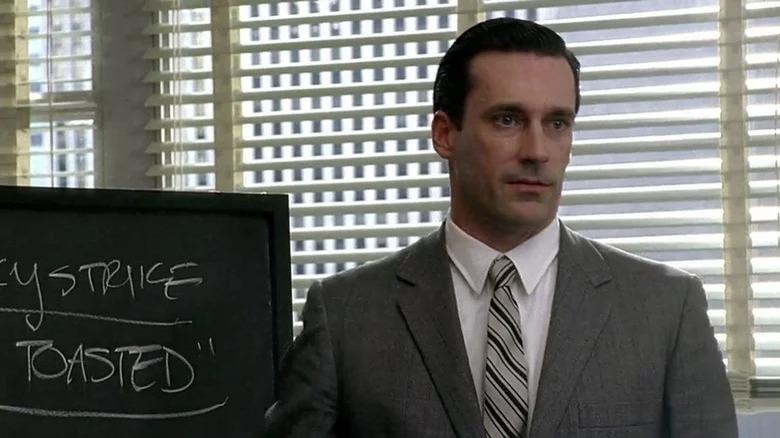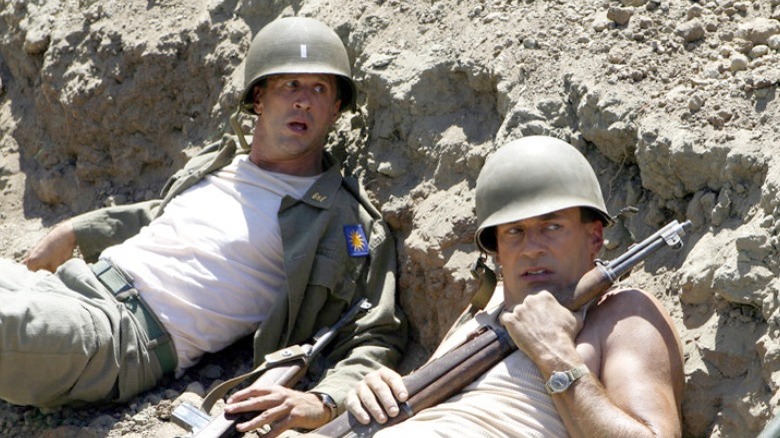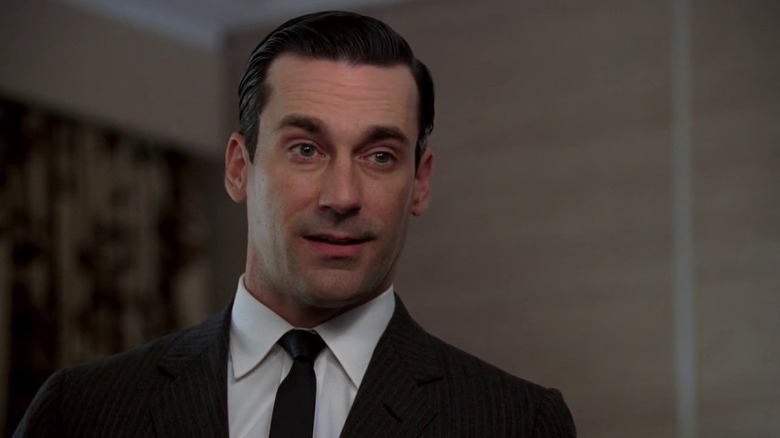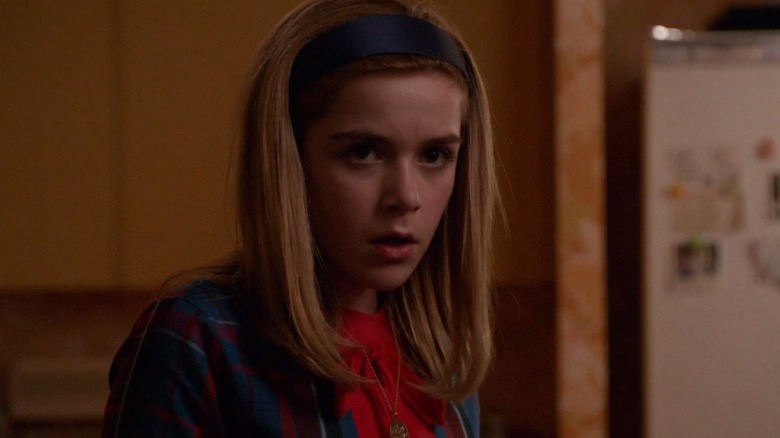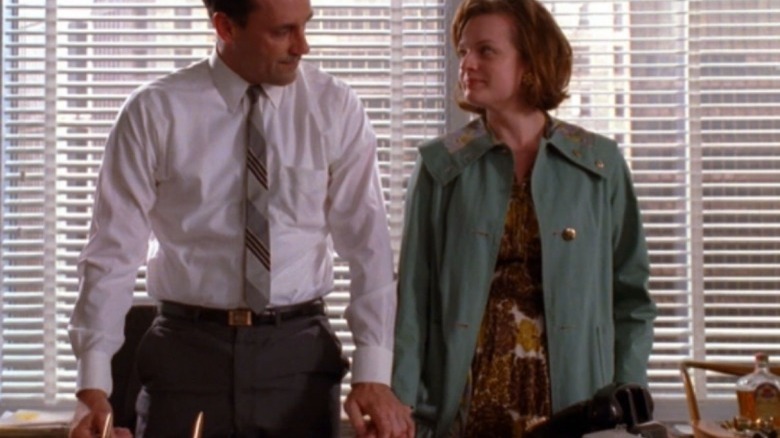Don Draper's 7 Best And 7 Worst Mad Men Scenes Ranked
There is no "Mad Men" without Don Draper. Jon Hamm does the impossible over the course of the storied AMC period drama, by fully inhabiting a man as believably charming as he is emotionally stunted. Viewers soar on the wings of his creative triumphs and cringe at the sight of his personal failures. Just like the ad agency that eventually bears his name, Don rises and falls over the course of the decade that "Mad Men" depicts with a waltzing, drunken, two-steps-forward-one-step-back stumble. This journey is never less than riveting.
"Mad Men" is a show of many pleasures, ranging from its depiction of landmark historical events to the small details of its incredible production design. But it succeeds on the strength of its characters, and the increasing meaning and nuance every scene gains as time marches on. As we begin to understand Don Draper, it hurts more to see him embark on yet another affair, or have too much to drink. We want to believe he can break the self-destructive cycle, but we're never sure how possible that truly is. We're here to trace the highest and lowest points of one of TV's greatest anti-heroes. These are Don Draper's seven best and seven worst "Mad Men" scenes, ranked.
14. Worst: The meeting with Hershey's
As the meme goes, some men will invent an entirely new identity instead of going to therapy. By the Season 6 finale, "In Care Of," the mirage of Don Draper is coming apart at the seams. Drinking too much and watching his marriage to Megan (Jessica Paré) crumble, Don has decided to move to Los Angeles to start over yet again. He successfully lies to Hershey's executives, telling a wholesome story about how his father would tousle his hair and buy him a Hershey bar for mowing the lawn. But with a glance at the forlorn Ted (Kevin Rahm), whose place in California Don is set to take, the wall separating Dick Whitman from Don Draper finally dissolves.
Don tells the stunned Hershey's suits that he was actually an orphan raised in a brothel, and was sometimes rewarded with a Hershey bar for stealing change from the clientele's pockets. He ate the candy alone in his room, pretending to live a normal life. While this moment is cathartic and important, it's freighted with the sinking feeling of something happening in the exact wrong time and place. Don is swiftly suspended from work, and strains his marriage even further by sending Ted to Los Angeles. "I have to say this," Don tells the Hershey's execs. "I don't know if I'll ever see you again." This sums up the moment's sense of absolute doom.
13. Best: Finding Peggy at the hospital
Don's particular method of moving on at all costs isn't really the healthiest thing in the world. But going to find Peggy (Elisabeth Moss) after she gives birth to a child she doesn't want and convincing her to come back to work is one of the most selfless acts Don performs in all of "Mad Men." As we see in flashback in Season 2's "The New Girl," Don tracks Peggy down by contacting her roommate and mother. The latter woman tells Don that Peggy has tuberculosis and is in quarantine. "I guess she thought that was supposed to lessen my concern," he remarks, glibly.
Without asking questions, Don tells Peggy to tell the doctors whatever they want to hear and then get out of there. "This never happened," he tells her. "It will shock you, how much this never happened." It's one of the biggest moments in a friendship that runs the course of the show and fuels many of the best episodes of "Mad Men." Don is drawing on a deep well of personal denial and enormous will to impart strength to his newest copywriter. It's as touching as he ever gets.
12. Worst: Drunk driving with Bobbie Barrett
It would take all day to list the low points of Don Draper's extra-marital history. A serial womanizer, he cheats on Betty (January Jones) and Megan too many times to count. Often, there's at least some sort of emotional component to the affairs — not that this makes them anything to root for. But his Season 2 dalliance with Bobbie Barrett (Melinda McGraw) is purely selfish, and far and away one of the worst ideas Don ever has. She's the wife of an actor who's important to one of his company's ad campaigns, for one thing. For another, the two of them seem to take a juvenile pleasure in conducting the affair under both of their spouses' noses.
The whole thing reaches a low point in "The New Girl," when Bobbie distracts a soused Don while he's driving them to the beach. To no one's surprise, they get into a car wreck. In the aftermath, Don has to call Peggy to pay his bail, and also to harbor Bobbie until her black eye heals. This torrid and completely unnecessary relationship could easily have gotten people killed, in addition to endangering Don's professional and personal lives.
11. Best: Getting fired
Don Draper's best moment of inspiration isn't used on behalf of an ad campaign. In the thrilling Season 3 finale "Shut the Door. Have a Seat.," Sterling Cooper is set to be sold along with their British parent company to dreaded industry behemoth McCann Erickson. British overlord Lane Pryce (Jared Harris) tells Don that he, Roger Sterling (John Slattery), and Bert Cooper (Robert Morse) won't be able to buy the company back, and says he should fire them for even trying to involve him in such plans.
This is the moment Don realizes an important truth: Lane can, in fact, fire them all, freeing them from their contracts and enabling them to escape with all of Sterling Cooper's most valuable clients. This sets off one of the most entertaining episodes of the series, as the partners go about stealing supplies, recruiting a skeleton staff, and plotting to keep it all secret. It's Don's greatest professional victory — one he sorely needs, as his marriage is falling apart simultaneously. After a life of charade and existential drift, Don finally moves to create something of his own. "So you do want to work in advertising after all," Roger tells him. He's exactly right.
10. Worst: A drunken dalliance with Allison
Initially, one of the most admirable things about Don Draper is his gentlemanly treatment of secretaries. He kindly rebuffs Peggy's clumsy advance in Season 1, and scolds Pete Campbell (Vincent Kartheiser) and others for their sexist comments. As Roger, Pete, and even Harry Crane (Rich Sommer) have dalliances with ladies from the steno pool, Don seems like the one person who doesn't mix business with pleasure.
But as he spirals out of his divorce from Betty in Season 4's "Christmas Comes But Once A Year," this all changes. After getting so drunk at the office Christmas party that he forgets his keys, faithful secretary Allison (Alexa Alemanni) helps him into his apartment. He takes this as an opportunity to make a pass at her, which she accepts. Displaying no emotional intelligence to speak of, he all but pretends that it didn't happen the next day, creating an awkward rift that will eventually drive Allison to quit. One of the last stable relationships in Don's life is torpedoed by one drunk and impulsive moment.
9. Best: Finally finding human connection
Don Draper doesn't have much use for other people, other than as consumers he can sell products to. He apologizes when necessary, and makes sporadic efforts in a few relationships. But it's not until the series finale, "Person to Person," that we see Don really listen to another human being. When all is lost, he finds himself tagging along with an old friend's niece to the famous Esalen Institute, a California retreat famous for its spiritual workshops and general hippie vibe. Far from everything he's ever loved and feeling desperate, he numbly stumbles into a group discussion.
While most shows would have Don finally open up in this scene, "Mad Men" allows a man named Leonard (Evan Arnold) to speak instead. Leonard is an utterly ordinary man who feels invisible, unlike the enigmatic and handsome Don. But Leonard's descriptions of feeling unloved his entire life and having a dream about being left on a shelf in the refrigerator strike something deep within Don. He is compelled to stand up and hug Leonard as he breaks down. After years of moving the world with his eloquence, Don is silent and listening to someone else in the emotional climax of "Mad Men."
8. Worst: Commodifying human connection to sell Coca-Cola
What does Don Draper do at the end of "Mad Men"? He sells out the spirit of the '60s to move Coke, of course. It's a perfectly fitting ending for the series and makes total sense for the character, but it's one of the most cynical acts of Don's career, especially after the emotional roller coaster he undergoes in the final season. He's clearly at the end of his rope when he reaches the Esalen Institute, but he actually begins to open himself up to others once he's settled in. After embracing the unfortunate Leonard, we even begin to see him heal some deep wounds.
But then the show cuts from a meditating Don to Coca-Cola's famous "Hilltop" ad, in which bright-eyed young people sing, "I'd like to buy the world a Coke." This successful campaign used the imagery, spirit, and folk-tunes of the hippie movement to sell sugar-water for a giant corporation. The implication is that Don drew inspiration from his spiritual reset to create one of his best ads yet. It's a victory in the sense of "Mad Men" being a love letter to the moment of inspiration, but in terms of Don personally, it's a crummy way to go out.
7. Best: Don writes tags again
In Season 7's "The Monolith," Don swallows his pride and gets back to work. He begins the episode in a kind of purgatory: The partners see him as too much of a drunken liability to resume his job, but they can't afford to buy him out and actually get rid of him. So, Don has agreed to relatively humiliating rules in order to be an ad man again. He can't drink unless he's in a meeting, he can't be alone with clients, and he's basically reduced to working as a junior copywriter, answering to Peggy.
When Peggy assigns Don to write 25 tags for Burger Chef by Monday, he childishly throws his typewriter across the room and spends the next few days sneaking alcohol and skipping out on work. But after old friend Freddie Rumsen (Joel Murray) gives him some coffee and sage advice, Don finally buckles down and sits at his typewriter. The Hollies' "On A Carousel" plays as Don starts typing, reminding us of his Kodak pitch in the immortal episode "The Wheel." This ties his professional rise, fall, and renewal together in an incredibly satisfying way.
6. Worst: Turning his brother away
Dick Whitman's transformation into Don Draper claims many victims in indirect ways over the course of "Mad Men," but none more tragic than Adam Whitman. After seeing a picture in the paper, Don's half-brother seeks him out and gets the coldest shoulder imaginable. At first, Don can't even bring himself to acknowledge that he recognizes his own sibling. Then, he meets with Adam at a diner, and finally admits that he missed him, but says his life only has one direction: forward.
All Adam wants is to be part of his life — to have a family again after years of loneliness. But Don callously reduces the value of family to the fat check he gives Adam to leave New York and never return. Much later, Don changes his mind ... only to discover that Adam killed himself not long after he drove away. He carries this regret with him forever after. Spurning Adam is, by far, his most haunting choice.
If you or anyone you know is having suicidal thoughts, please call the National Suicide Prevention Lifeline by dialing 988 or by calling 1-800-273-TALK (8255)
5. Best: Lucky Strikes
Don's last-minute brainstorm in the superb pilot episode "Smoke Gets In Your Eyes" is one of his brightest moments. After selling cigarettes on their health benefits for years, Don must confront what science has started to figure out: Smoking isn't good for you. Thus, Don needs a new strategy for Lucky Strike to bail out his agency and his own career. He spends most of the episode banging his head against the wall with no luck, and goes into a pivotal meeting without having anything to pitch.
When one of the cigarette execs points out that at least all of their competitors have the same problem, we get our first zoom-in on the face Don makes when the wheels are turning. "This is the greatest advertising opportunity since the invention of cereal ... we can say anything we want," he muses. Everybody else's cigarettes are poisonous, but Lucky Strikes are toasted. In a breathless moment, Don articulates a simple fact: Advertising's power lies in letting people know that what they're doing is okay.
4. Worst: Stealing another man's identity
Dick Whitman was never meant to be a solider. In the flashbacks we see of his time in Korea in Season 1's "Nixon vs. Kennedy," he's terrified and bumbling, to the point that he drops a lighter. This mistake causes an explosion that kills his superior officer, Donald Draper (Troy Ruptash). While this is obviously an accident, what follows is not. Dick switches dog tags with the dead man, essentially swapping identities, and takes Don Draper's place. Soon after, he's sent home.
This is the defining moment of the former Dick Whitman's life. It cements the lie that becomes who he is, leading to so many other tragedies, triumphs, and trials. The anguish he causes Anna Draper (Melinda Hamilton), though they eventually become close, is indefensible. He also creates a life for himself that requires he continually deceive his wife, children, and co-workers. In one impulsive moment, he ensures he will never feel completely safe or comfortable for many, many years to come.
3. Best: The Carousel pitch
Of all Don Draper's fantastic pitches, the one he makes to Kodak in the Season 1 finale "The Wheel" is his most eloquent, moving, and personal. Don, who's just learned of his brother's death, is tasked with coming up for an ad campaign for Kodak's new slide projector. Renaming the product the "Carousel," he makes slides of himself, Betty, and his children to accompany his presentation.
"This device isn't a spaceship," he says. "It's a time machine ... it takes us back to where we ache to go again." Don hits a home run by selling the Kodak execs on the same pitch he sells himself, every single day: A perfect life can be attained, no matter what you've done. In mourning the brother he turned away, Don seeks comfort in his confident new persona and idyllic suburban life. This wins over the room and launches Don into the rest of the series in intensely cathartic style.
2. Worst: Sally catches Don cheating
The biggest gut-punch of "Mad Men" is the moment Sally (Kiernan Shipka) walks in on her father having yet another affair with downstairs neighbor Sylvia Rosen (Linda Cardellini) in Season 6's "Favors." It's an especially tragic case of bad timing: Sally is there to recover a childish love note written to Sylvia's son, whom Don has managed to save from being sent to Vietnam. This act rekindles his affair with Sylvia after she tries to move on.
After dozens of affairs over the course of his two marriages, Don has had every chance to stop — or at least, every chance to ensure he won't expose his daughter to them. It all comes crashing down in one sickening moment, aided by a low, horror movie-esque score and the shocked performances of all three actors. Having children gives all of your actions more weight and consequence. Now that Sally understands this fundamental fact of Don's nature, there's no going back to the innocent bond they used to share.
1. Best: Don holds Peggy's hand
Don Draper's greatest scene in "Mad Men" could be any scene he's part of in Season 4's "The Suitcase." It's not only one of the show's best episodes, but one of the best TV bottle episodes ever made. A stunning story about Don and Peggy spending a night in the office working on a Samsonite campaign, "The Suitcase" sees Hamm and Moss do incredible work as their characters' personal and professional lives fall apart. As Don mourns Anna and Peggy ends a relationship, they fight, laugh, and deepen the most complicated and rewarding bond on the show.
The scene at the episode's end, when Don squeezes Peggy's hand, echoes her naïve and brief attempt at seducing him in the show's pilot. In doing so, it shows how far their relationship has progressed. The Samsonite pitch ends up being a topical spin on a boxing match, but on "Mad Men," the ideas are less important than the characters' commitment to having them. Don and Peggy are idea people, and because of this, they'll always fundamentally understand one another in a way account execs and consumers can't. In this episode, that means everything.
